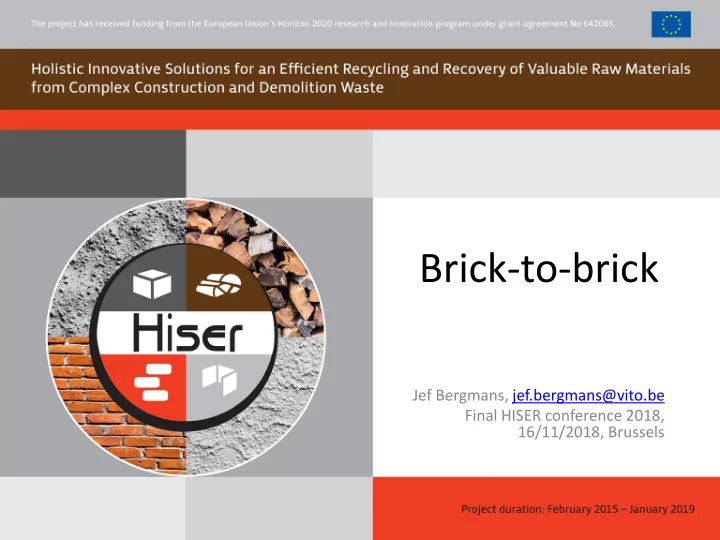

Brick-to-brick Jef Bergmans, jef.bergmans@vito.be Final HISER conference 2018, 16/11/2018, Brussels
• Flemish production: 3,5 Mton masonry products per year • Mixed aggregates (40-60 m% masonry) – 4,3 Mton (32m% of the recycled aggregates) – <5 € /ton • Masonry aggregates (>60 m% masonry) – 0,3 Mton (3m% of the recycled aggregares) – <3 € /ton
• Goal: 10% replacement of the raw materials in bricks with recycled C&DW (masonry fraction). complete replacement of the inert sand fraction: opening substance (‘temper’) • Other materials (e.g. clay content): not changed
Lab tests • No quality decrease with gypsum or mortar contamination • Gypsum contamination: potential flue gas problem • Concrete => limestone => pop-outs • Presence of lime => distribution is crucial
Sampling • Reference: porphyry sand (Dumoulin) • Mixture 1: production waste • Mixture 2: selective demolition
PRODUCTION PROCESS 8 Voettekst invulling
9
10 Voettekst invulling
11 Voettekst invulling
12 Voettekst invulling
Results 25 Compressive strength (in Mpa) 20 15 10 5 22 16 18 0 Reference Production waste Demolition waste 15 2,0 Water soprtion (24 h, in %) Density (kg/dm³) 10 1,5 1,78 1,80 1,81 12,6 13,0 13,5 5 Voettekst invulling 1,0 13 Reference Production waste Demolition waste Reference Production waste Demolition waste
• Soluble salts: – Na + K: 0,05% – Mg: 0,01 % • Freeze/thaw (CEN TS 772-22): no visible damage
Masonry aggregates = Low-grade mixed aggregates
Conclusions • 10 V% replaced • Newly produced bricks meet all the required standards • Robustness against the presence of mortar => The sand fraction of a selectively demolished masonry fraction can easily be recycled in new bricks
Recommend
More recommend